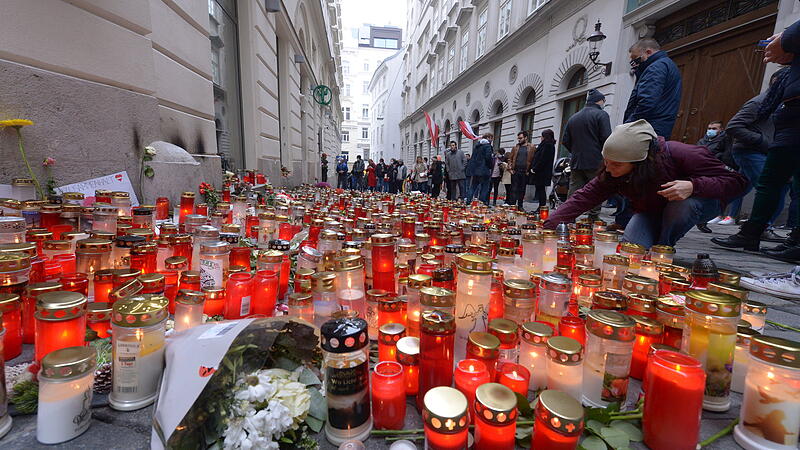Image: HELMUT FOHRINGER (APA)

Image: HERBERT PFARRHOFER (APA)
The Supreme Court partially overturned the judgments due to deficiencies in findings. The court only has to clarify whether there was a terrorist organization. There should be a verdict on April 24th.
- Also read: Contributor to the Vienna attacker back in court
All three men were found guilty in February last year of supporting the later attacker in the run-up to the crime. There will be no change to the guilty verdicts for aiding and abetting murder, but the convictions for membership in a terrorist group or criminal organization were overturned by the Supreme Court. The reason for the rehearing ordered by the Supreme Court were criticized errors in the legal instructions given to the jury and a lack of specific wording in the verdict. This could change the level of punishment.
Wanted to emigrate to the IS war zone
After the opening statements by the public prosecutor and the defense attorney, the first questioned was the 25-year-old who wanted to emigrate to the IS war zone together with the later attacker in 2019 and was therefore convicted of membership in a terrorist organization and was imprisoned. After serving his sentence, he “tried to lead a better life” and “had nothing to do” with IS. “I don’t vote, there are Islamic reasons for that,” he replied to the judge’s question about how he felt about democracy. But he adheres to the law. He only watched and distributed videos – for example those of IS recruit Mirsad O., who was sentenced to 20 years – that “weren’t about IS,” and he doesn’t think that’s a problem. He would have nothing against living in a country where Sharia law applies.
- More on the subject: Terrorist attack in Vienna: trial must be repeated in some cases (December 4, 2023)
The 29-year-old, who had lived with the later attacker in the weeks before the attack, pleaded not guilty to all charges. He described his religiosity as “conservative.” He was also asked the question about democracy – “Every legal form has its advantages and disadvantages”. He doesn’t vote, but as a Muslim you are generally allowed to do so. And: “If I lived in Graz, I would probably vote for Elke Kahr (Mayor of Graz, KPÖ, note).” He never had a connection to IS, but he dealt with it. “I read and watched a lot.” Among other things, he was shown an incriminating video that he had sent to his wife. As he had done several times during the trial, he emphasized that he had only forwarded the video so that she could translate it.

Image: HERBERT PFARRHOFER (APA)
“I didn’t send IS propaganda, but nasheeds (songs or praises with religious content, note),” the 23-year-old emphasized at the beginning of his interrogation. He doesn’t think much of the Islamic State. “You have been convicted of this twice,” the judge replied. “I can break away from IS, but I will not break away from the flag (meaning the Shahada, the creed of Islam, often printed on flags),” said the defendant. When asked by a jury, he emphasized that he had watched “certain” videos, but had not become radicalized. “I have never and I will never say that the attacks in Europe are justified.”
“Guilty verdict is clear, he picks”
In her opening statement to the jury, the prosecutor emphasized several times that it was no longer about aiding and abetting murder. The verdict of guilt is “the one who pecks”. The three defendants are “murderers by contribution.” The task of the lay judges is to decide whether the three defendants were also members of the terrorist group or criminal organization “Islamic State”. Both can be answered clearly with “yes”. Members of IS are not only those who travel to the war zone themselves or carry out attacks in the name of the terrorist organization, but also those who “support the cause” – for example by sending propaganda videos and radical Islamist “Nasheeds”. The reason for the partial reversal of the verdict is that the definition of IS was not included in the questions to the jury in the first instance verdict and was therefore not sufficiently explained.
However, both the prosecutor and the three defense attorneys summarized for the jury why the three men were ultimately convicted of aiding and abetting murder. A now 23-year-old received 19 years in prison for handling the purchase of weapons and ammunition and establishing contact with the arms broker. A 25-year-old who supported the attacker from May 2020 until the day of the attack, knowing his intentions, helped to choose the target of the attack and made preparations to escape by obtaining fake papers, was sentenced to 20 years. The 29-year-old, who encouraged the later assassin to carry out the crime up until the day of the attack and prepared the murder weapons, ammunition and other paraphernalia in the assassin’s apartment, received a life sentence.
Officer questioned
At the request of the 29-year-old’s defense attorney, an official from the Vienna State Office for the Protection of the Constitution (LVT) was interviewed on Thursday afternoon. He testified that the defendant had repeatedly appeared in the context of investigations, but was never “so much in focus that concrete measures were taken.” In the past, the defendant had repeatedly visited mosques where radical preachers like Mirsad O. worked. “Exactly in the same environment” were several cousins who had traveled to IS territory. “It was a closed family.” To this day, we don’t know exactly what became of some of them.
The trial will continue on April 24th. After the closing arguments from the prosecution and the defense, the eight jurors will reach a verdict.
My themes
For your saved topics were
new articles found.

info By clicking on the icon you can add the keyword to your topics.
info
By clicking on the icon you open your “my topics” page. They have of 15 keywords saved and would have to remove keywords.
info By clicking on the icon you can remove the keyword from your topics.
Add the topic to your topics.
Source: Nachrichten




